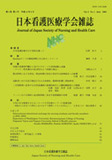Japanese
English
- 有料閲覧
- Abstract 文献概要
- 参考文献 Reference
論文要旨
日常生活における家族の負担が大きいと言われる「アトピー性皮膚炎の乳幼児をもつ母親」28名を対象に、日常ケア実践の資源として、『看護専門職によるサポート』を母親たちがどのように活用し認識しているか、その現状を知ることを目的として質的調査研究を実施した。研究参加に同意の得られた28名のうち、26名の母親に面接を実施した。面接逐語録から、「看護専門職のサポートを活用した経験」および「看護専門職に対するサポート源としての認識」についての内容を、看護婦(士)・保健婦(士)に分けてそれぞれ抽出し、類似した内容毎にまとめてカテゴリー化を行なった。その後、J.V.Zerwekhの家族ケア提供モデルに照らして分析した。看護婦(士)については、サポートを受けた経験どころか『接触がない』という母親が80%以上を占めた。保健婦では、食事制限の方法について相談するなど『主体的に活用』している母親がいる反面、『不信感』などのネガティブな反応を示した母親もみられた。母親たちがサポートを受けたと認識していた看護専門職のケアは、家族ケア提供モデルの『自分にできる事を励ます』につながる「学ぶ事を手伝う」「役にたつ」「情緒面に働きかける」の3カテゴリーに限られていた。今後は、「他の専門職と協働する」「タイミングを図る」などのケア能力を発揮する事が課題ではないかと考えられた。
Abstract
In this study, mothers' experiences and perceptions about the support they received from nurses for their infants with Atopic Dermatitis(AD infants)are described. Twenty-eight mothers agreed to participate, and twenty-six mothers were interviewed about their individual experiences with nurses. Verbatim records were made from the mothers' interviews about "the experiences that involved the support of nurses" and "the mothers' perceptions of nurses as a support resource". The contents of the interviews were divided into two broad classifications :out-patient nurses and public health nurses. These were then categorized further. After that, these were compared and analyzed with the J.V. Zerwekh' Family Care Giving Model for public health nursing.
The results indicate that many mothers(80%)received no support from nurses. They stated that they "had no chance to talk with nurses". On the other hand, the mothers showed both positive and negative reactions to the consultations concerning dietary restriction sfrom public health nurses.
Some mothers observed that nurses encouraged them to provide self-care. However, nurses must develop their own professional ability, especially a more supportive attitude.
Copyright © 2002, Japan Society of Nursing and Health Care All rights reserved.


